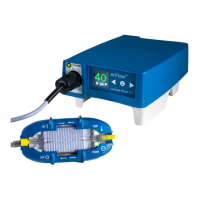- 38 of 40 -
4400-0024-EN Rev A
Appendix F: enFlow IV uid/blood warming system operational checklist—alternative method
Warmer Serial No Controller Serial No
Warming system location/identier
Date
Procedure Instructions
Pass/Fail Input Temp Output Temp
Inspection
Ensure all cords and connectors are in good condition and void of any cuts, cracks, or frays.
Ensure units are clean and void of any cracks or other signs of damage.
Performance Test Setup
Set up the system for normal operation. Provide a 0.5 liter source of uid at 20 °C ± 2 °C. Measure the temperature within 22.9 cm (9 in) of both the input and output
connections of the Disposable Cartridge by inserting a T connector in the direct uid path, which will accommodate a temperature probe. Connect the temperature probes to a
meter capable of measuring between 10 °C and 60 °C with 0.1 °C accuracy. Prime the IV line setup according to standard IV protocols. Turn the enFlow system on and establish a
uid ow of 100 ± 20 mL/min. Wait for the temperature probes to stabilize.
Record the input uid temperature. Input uid temperature 20 °C ± 2 °C.
Record the output uid temperature. Output uid temperature 40 °C ± 2 °C.
Over-Temperature Alarm Check
Use performance testing setup. Change the source of uid’s temperature to 50 °C ± 2 °C. Turn the enFlow system on and establish a uid ow of 100 ± 20 mL/min. Wait for the
temperature at the probes to stabilize.
Record the input and output uid temperatures.
The High Priority Over Temp Alarm occurs within less than 20 seconds of reaching input temperature. (See Appendix C.)
High Priority Alarm indicated by Audible beep and Over-Temp message in Red appearing on the Controller
Red Temperature LED ashes on the Warmer, also indicating a High Priority Alarm
Electrical Safety
Follow safety analyzer manufacturer’s instructions
Test leakage current at the AC power cord using a safety analyzer.
Test leakage current of the Warmer to the saline in the IV line using a safety analyzer.
Inspected By
Enter initials and conrm date.
Comments, Observations or Corrective Actions
Note: Please reference the Preventative Maintenance Procedure (Appendix E) for the specic procedures in order to perform the tests listed above.

